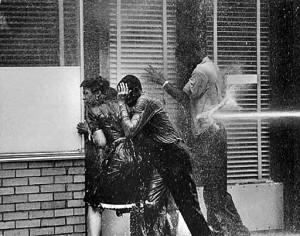 When I was 14, my friends and I were playing at Richard’s tenement apartment in the South Bronx, and Richard’s Mom asked quietly if I would leave and get my friends to go as well.
When I was 14, my friends and I were playing at Richard’s tenement apartment in the South Bronx, and Richard’s Mom asked quietly if I would leave and get my friends to go as well.
I must have looked puzzled when I said I would because Richard’s Mom said in a whisper, “You can come back later but don’t bring Stevie.”
Stevie was black. He was one of my friends.
It was my first encounter with racism.
This is how an individual conscience awakens to bigotry.
In the neighborhood, among us kids, we were from lower middle class families, nobody had gone past High School, not the parents, nor the kids, we were a mixed lot of Irish, Italian, Jewish, Black and Puerto Rican boys mostly.
We played stickball, sewer to sewer, hand ball, swung from the hanging ladders off the fire ‘scapes at street level, ran up and down alleys, through basements and court yards.
We were friends with unnoticed differences, who talked trash, had fist fights, but got along.
Senator Patrick Moynihan might have considered us a species of his “melting pot” but we were hardly homogenous. We celebrated our differences while remaining companionable.
There’s a lyric in the musical, South Pacific, that “You’ve got to be taught to hate and fear.” We neither did hate nor fear.
At 17 and a High School Junior in 1963, I saw black high school students on tv, my age, pushed up against the wall, for peacefully protesting segregation, slammed by high-pressure fire hoses, open full, blasting water, by order of the Birmingham Police Chief, “Bull” Connor.
This was about hate and fear.
In a student essay, I struggled to understand how the KKK, this sheeted group of intolerant vigilantes, traveled the land bullying, hurting and lynching blacks, hating Jews and Roman Catholics, and burning crosses that defied the teachings of scripture.
On April 4, 1968, a principal architect of the peaceful struggle for equal rights, the Reverend Martin Luther King, was shot dead.
Senator Robert F. Kennedy told a crowd in Indianapolis that King’s death need not lead to “greater polarization,” and the Senator insisted that the nation must instead indulge “love, and wisdom, and compassion toward one another, and a feeling of justice toward those who still suffer within our country, whether they be white or whether they be black.” The young Senator from New York instructed it was past time to “tame the savageness of man and make gentle the life of this world.”
We have so much to learn about getting along.
My paternal aunt married a wonderful man, Jack, who left Lima, Peru, for the United States, who volunteered to fight the Nazis in World War II, and, for his sacrifice, this nation made Jack a citizen.
Uncle Jack was a striking figure, handsome, strong, a hardworking man, who worked steadily. Still other men disrespected this WWII vet because of his Latin looks and Spanish accent. Our conscience, our notion of liberty, tells us that America welcomes those “yearning to breathe free.” But not everyone respects the idea that is America.
My Dad and my uncle Charlie served in World War II. Charlie had to fight to kill to have a weapon to fight ashore when General Patton’s army crossed from Sicily to Italy. In a moment of calm, at camp afterwards, he was shot by a German rifleman, took the full impact of the blast to his chest, lifting him, carrying him backwards. The rest of his service was as a POW. Years later, Charlie died, bleeding from this badly treated wound. He gave his life for the country.
In the summer of 1969, when touring the continent on a BSA motorcycle, I took a solitary ride through the beautiful countryside outside Munich to the Dachau Nazi Concentration Camp, the longest operating camp of its type.
I walked through dark black metal gates with a sign arching overhead, that said, “Arbeit Macht Frei,” meaning, “Work makes you free.”
The barracks stacked the prisoners in wooden berths, one upon another. The prisoners were underfed, over-worked, and over time, resembled walking x-rays of bones barely concealed by loosely hangng flesh. 32,000 thousand Jews, political prisoners, and others died at Dachau. Their only “freedom” was the release to death from the forced work at the “camp.” German Newspapers told the public that the departure of Jews and others was merely “the removal of the enemies of the Reich to concentration camps.” Thus, do governments lie to lull the people.
An American of conscience must resist bigots, racists, white supremacists, KKK members, Nazis, whatever the intolerant and hateful may call themselves over the generations, for these are political pathogens in a republic, and the true enemies of the people.
In this vein, we should recoil as well from those who tolerate or support this malevolent lot, if we have a conscience, if we call ourselves Americans, and if we believe it is self-evident “that all men are created equal.”
